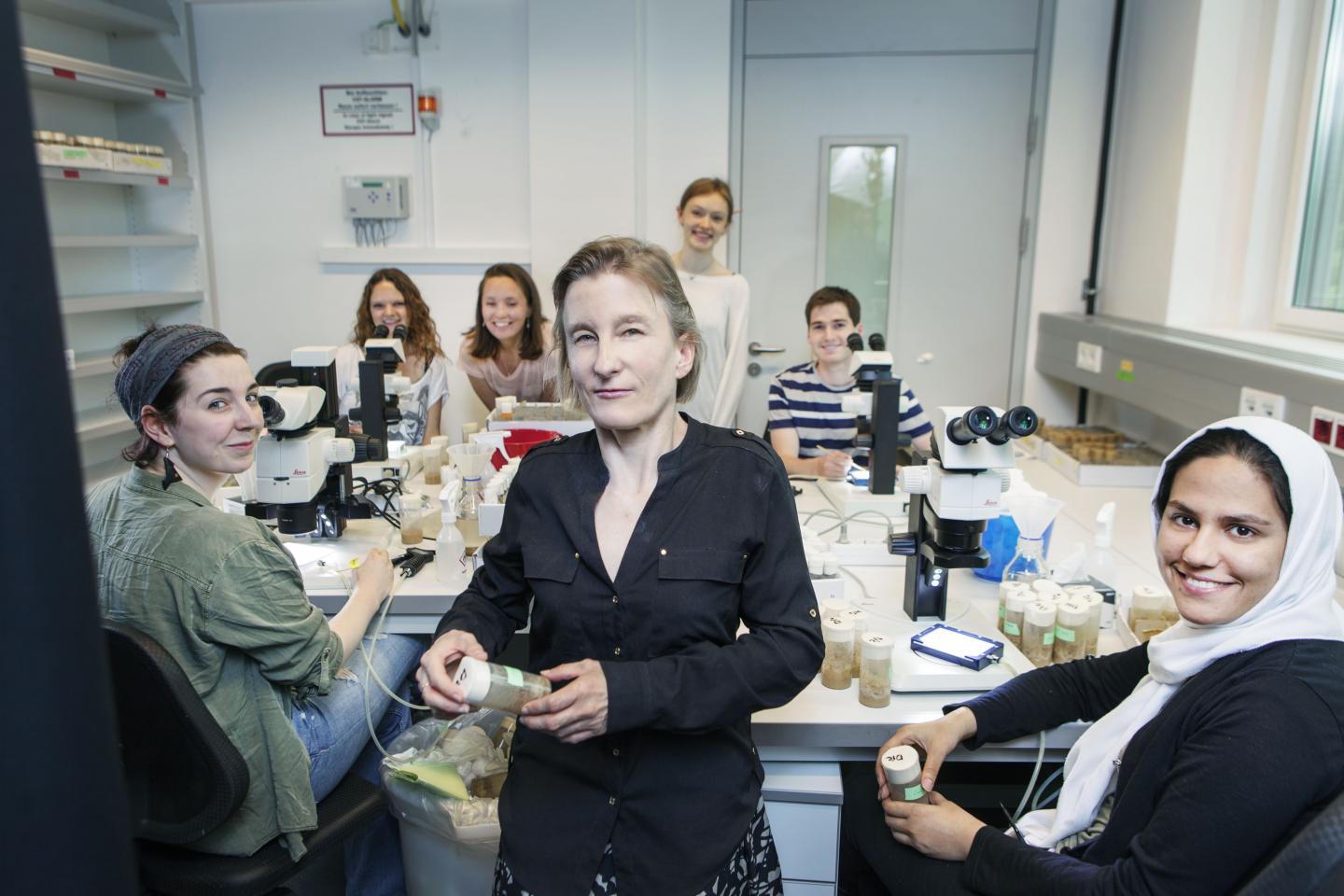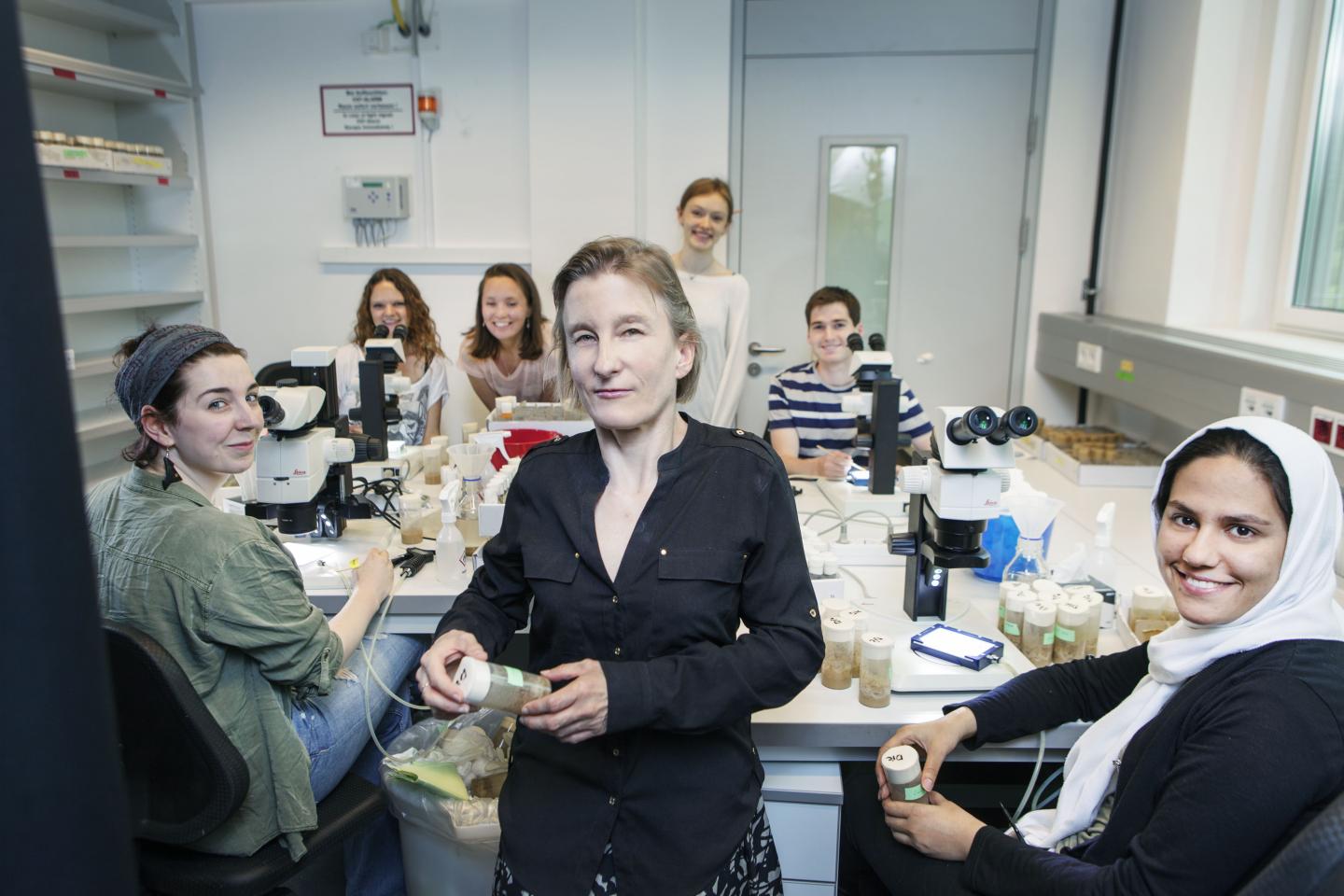
Credit: IST Austria/Reiner Riedler
Metastasis, the process in which a tumor spreads to other parts of the body, is responsible for 90% of deaths from tumors. It is the greatest challenge to a cancer patient's survival. Metastatic spread occurs in several steps, these include that tumor cells become mobile and cross into and out of blood vessels. How these steps are controlled is not yet fully understood, but provides avenues for treatment. In a new project, the lab of Daria Siekhaus, Professor at the Institute of Science and Technology Austria (IST Austria), will investigate the role of a novel protein in metastasis. The group previously identified a protein in the fruitfly Drosophila that could play a role in metastasis. In cooperation with two researchers at the Karl Landsteiner University for Health Sciences, they will seek to understand its role in mice and human tissue. This project is funded by the NÖ Forschung und Bildungsges.m.b.H. (NFB).
From flies to mice to patients
In previous research, Daria Siekhaus' group identified a transporter protein, called CG8602, which is needed for macrophages to invade tissues during the fruitfly's embryonic development. CG8602 appears to be necessary for a larger amount of T antigen to be present on the surface of the invading cell. Intriguingly, such an increase in T antigens on the cell surface has been observed in metastatic cancer cells, and antibodies that block T antigens can reduce metastasis. An ortholog, or gene with the same function that evolved from the same ancestral gene, is present in mammals. However, no studies have yet looked at the function of this ortholog, called MFSD1.
The NFB-funded project will examine what role MFSD1 plays during the initiation of metastasis in the mouse. Questions the researchers seek to examine include: Is MFSD1 involved in changes to proteins, such as their glycosylation or stability? And does this affect metastasis? To transfer the Siekhaus' lab knowledge in fruitfly research to the mouse model, a new postdoc joined the lab of Daria Siekhaus. Marko Roblek has extensive experience in studying cancer metastasis in mice. The NFB-funded project will be carried out in collaboration with Dr. Wiesholzer and Dr. Kitzwögerer at the Clinical Division for Internal Medicine, KLU University St Pölten. This collaboration allows the researchers to test how findings in the mouse model are relevant for the clinic. The scientists will analyze surgically resected tumor tissue from colon cancer patients to determine whether disease prognosis, i.e. whether a patient develops metastases, can be correlated with how much and where MFSD1 is found in the tumor samples. This research can lay the ground work for understanding the basic biology of a novel vertebrate gene that is involved in regulating invasion and metastasis. In the long run, this could eventually lead to the development of a new therapeutic target or diagnostic biomarker for the clinic.
Grants by the NFB
The project is funded through the Life Science Call 2016 of the NÖ Forschung und Bildungsges.m.b.H. (NFB). The Life Science Calls serve to competitively fund basic research in the life sciences. The grants aim to strengthen research competence in Lower Austria, as well as the connections between research institutes located in Lower Austria.
###
Researcher biographies
Professor Daria Siekhaus is an American who received her Ph.D. in Biochemistry from Stanford University's Medical School and joined IST Austria in 2012. She and her group seek to understand the migration of cells, in particular how they move within the complicated environment of an organism and penetrate through barriers that lie in their way. Daria Siekhaus received an FWF Standalone Grant in 2016 and a Marie Curie Career Integration Grant in 2013. Postdoc Marko Roblek joined the group of Daria Siekhaus this year. He is Slovenian and came to the University of Vienna to get his Master's degree in Molecular Biology in the Max F. Perutz Laboratories. He obtained his PhD in the field of Cancer Biology from the University of Zurich, Switzerland.
Dr. Martin Wiesholzer graduated from the medical school of the University of Vienna. He received his training in Internal Medicine, Hematooncology and Nephrology at the General Hospital of Vienna and the University hospital of St. Pölten. In 2015 he became the head of the Clinic I for Internal Medicine, University hospital St. Pölten. He teaches at the Karl Landsteiner University of Health Sciences.
Dr. Melitta Kitzwögerer who graduated as a doctor of medicine from the University of Vienna in 1989, has been working as a pathologist since 1991 at the Department of Clinical Pathology at the University hospital of St. Pölten. Being in charge of the tumor board she is continually dealing with neoplastic diseases.
IST Austria
The Institute of Science and Technology (IST Austria) is a PhD granting research institution located in Klosterneuburg, 18 km from the center of Vienna, Austria. Inaugurated in 2009, the Institute is dedicated to basic research in the natural and mathematical sciences. IST Austria employs professors on a tenure-track system, postdoctoral fellows, and doctoral students. While dedicated to the principle of curiosity-driven research, the Institute owns the rights to all scientific discoveries and is committed to promote their use. The first president of IST Austria is Thomas A. Henzinger, a leading computer scientist and former professor at the University of California in Berkeley, USA, and the EPFL in Lausanne, Switzerland. The graduate school of IST Austria offers fully-funded PhD positions to highly qualified candidates with a bachelor's or master's degree in biology, neuroscience, mathematics, computer science, physics, and related areas. See http://www.ist.ac.at
Media Contact
Elisabeth Guggenberger
[email protected]
43-224-390-001-199
@istaustria
http://Www.ist.ac.at
Original Source
http://ist.ac.at/nc/news-media/news/news-detail/article/new-project-to-investigate-the-role-of-novel-protein-in-cancer-metastasis/6/





